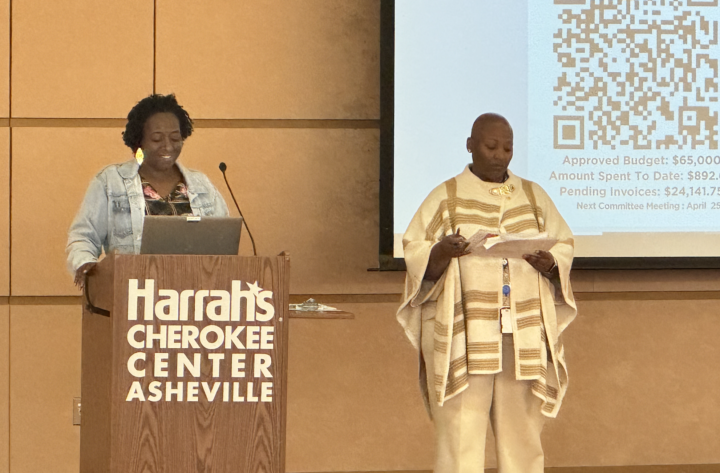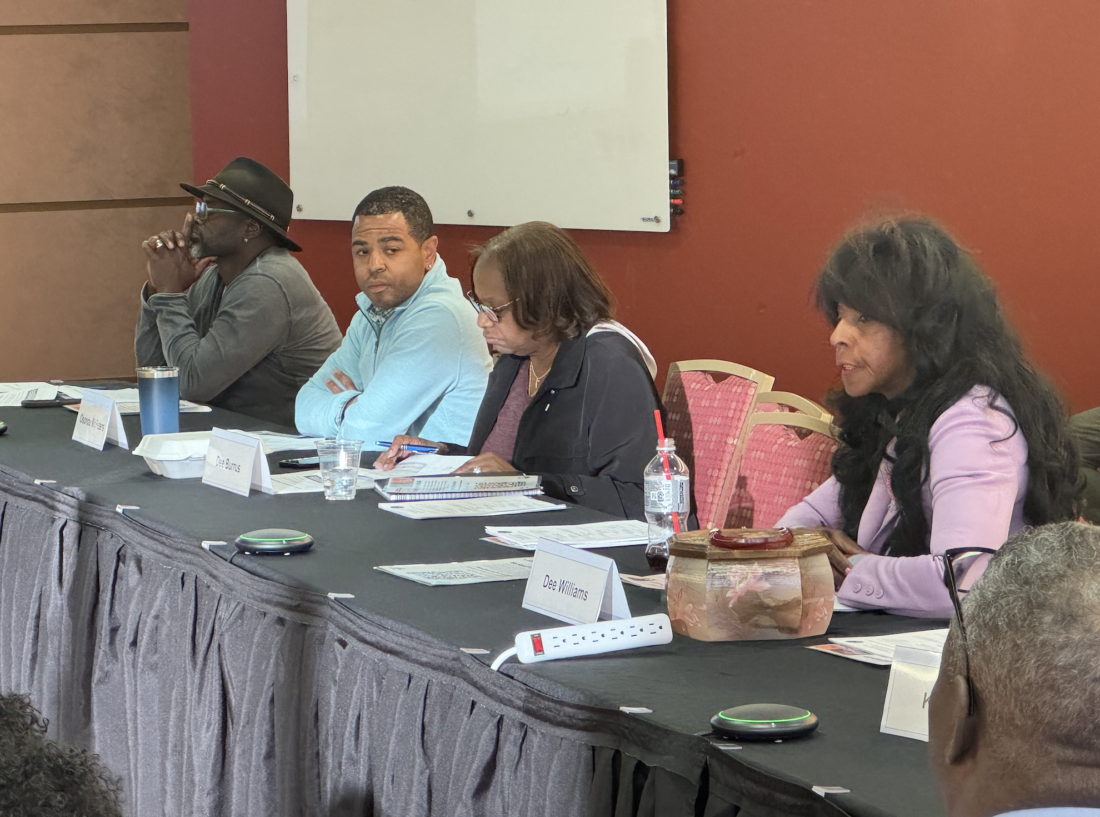As a deadline nears for the Community Reparations Commission, pressure mounts for the group to finalize its recommendations for how the City of Asheville and Buncombe County governments can make amends to their Black residents.
It’s been more than two years since Asheville and Buncombe County established the 25-member commission — one of the first reparations commissions in the country — charged with coming up with ways local governments can repair the damage from decades of systemic racism.
In October, the group requested an eight-month extension, which would have resulted in a December 2024 deadline. Instead, the commission was granted until June to finalize recommendations.
Since then, some commission members have commented on the need for more time in almost every meeting, while others have contended that they need to show the city and county that they can finish the job.
“We need more time. We need to see what that looks like. And for those who can’t stay on longer, that’s fine. But how do we keep moving this work forward to get to a place where we actually got community-vetted recommendations and actually are doing something that is really going to be impactful in the community?” asked Vice Chair Dewana Little on April 22.
That sentiment was echoed by commission members Bobbette Mays, Tiffany DeBellot and Osondu McPeters.
“Time is of the essence. It’s a part of the systemic oppression, this scarcity mindset and this crunch for time to rectify situations that took years to create, to fix problems and make recommendations about something that took hundreds of years to create. … It’s not fair to the process,” Little added.

City and county representatives have said that both governments’ equity departments will remain engaged with the commission beyond the June deadline if there still is work to do, but other support such as communications, legal and data services would expire. Sala Menaya-Merritt, equity and inclusion director at the City of Asheville, encouraged commission members to look at June as more of a check-in with its funding governments, suggesting that another extension could be obtained.
Facilitator Vernisha Crawford presented the timeline for the remaining two months, highlighting remaining priorities, including an ongoing community engagement campaign with Black residents of Asheville and Buncombe County.
Little, who leads the engagement campaign, said the community engagement committee has met with groups from several historically Black neighborhoods and public housing developments.
McPeters said many people are unfamiliar with the reparations process, suggesting the engagement effort is reaching those who have been overlooked. Little added that when introduced to the commission’s mission, people had a lot of suggestions and encouraged commissioners to participate in the outreach efforts as much as possible.
In recent meetings, commissioners have discussed ways to hold local governments accountable to the group’s recommendations after it disbands.
Crawford presented three options to continue the work — establish a nonprofit entity, an advisory council or partner with an existing nonprofit.
McPeters mentioned the Reparations Stakeholder Authority of Asheville as a potential partner. The RSAA is a Black-led institution that administers a complementary reparations fund “to be a perpetual resource for Buncombe County’s Black community,” according to its website. Manaya-Merritt said she has been in touch with the RSAA, which has asked to present at a future commission meeting. Little asked if the commission could invite several potential partner nonprofits to present at the same meeting to optimize everyone’s time.
Process delays
Earlier in the meeting, commission member DeWayne Barton asked about the status of recommendations from the economic development focus group. Menaya-Merritt said recommendations need to be reviewed by city and county legal staff before being brought to the full commission for a final vote.
That launched a long conversation during which many commission members expressed confusion about the process, summed up by commission member Kim Jones.
“We have been working on our recommendations for two years. We all have presented them over and over and over and over. So we’re talking about time. Mr. Barton brought a couple of recommendations [tonight], and one of them is the economic development center that, when we presented months ago, everyone was on board with,” she said.
The economic development center proposal included plans for a nonprofit that could provide accountability, she said.
Jones said that while the economic development focus group is trying to push forward, “once again, we’ve been pushed back because of process. So it keeps happening over and over and over. We have been working on this for two years. The economic development center has been vetted by the city and county, the guaranteed income has been vetted by the city and county. So we have done what we’re supposed to do. And tonight again, we have been told, ‘No, we have to wait.’ What are we waiting on? This right here is already in a plan of what we’re going to do next. So it’s just very frustrating,” she said.
Little recognized Jones’ passion and moved to get whatever recommendations had already been vetted and finalized on the commission’s next agenda for a vote.
Crawford noted that the commission had previously delayed voting on recommendations to fully engage with the community.
Commission member Dewayne McAfee said he would prefer to have something finalized to show people unfamiliar with the work rather than just saying the commission simply collected data.
Barton, McPeters and Dwayne Richardson agreed.
Crawford said she would put recommendations on an upcoming agenda for a vote.
The commission has four scheduled meetings, including a virtual one Monday, May 6. Its next in-person meeting is Monday, May 13.



Speaking of public housing, why are there so many boarded up, empty vacant apartments in HACA properties ? Makes no sense. Anyone questioned HACA lately about anything ? ? ?
The Reparations folx left me a flyer with a code to SCAN but it didn’t work on my phone. Until they change the name of the city, named for a slave owner, they just operating without license…I think results will be challenged by many as unlawful.
A total waist of time and money… no wonder nothing is getting done. If AVL/buncombe County were truly compassionate places, counseling and outreach services dedicated to all people who want help to become more productive citizens would be worth funding. Handouts don’t work, and race specific handouts only create dependency and division. By its nature reparations is a racist concept.
Pretty simple. Invest in lower socioeconomic communities and schools/clinics where people of all colors and pronouns would benefit from better resources…mandatory financial literacy training for anyone or any organization receiving funds. Early indicator that this would be a colossal failure: too many people on the committee and too many consultants.
This is taking too long. Asheville needs good clean safe and attractive for housing for everyone, especially those in marginalized communities who continue to be pushed out of largely white neighborhoods…which contain, if you notice, many very big very loud trucks with lots of trump stickers. But…God forbid anyone should try to strip away the unearned entitlements enjoyed by whites.